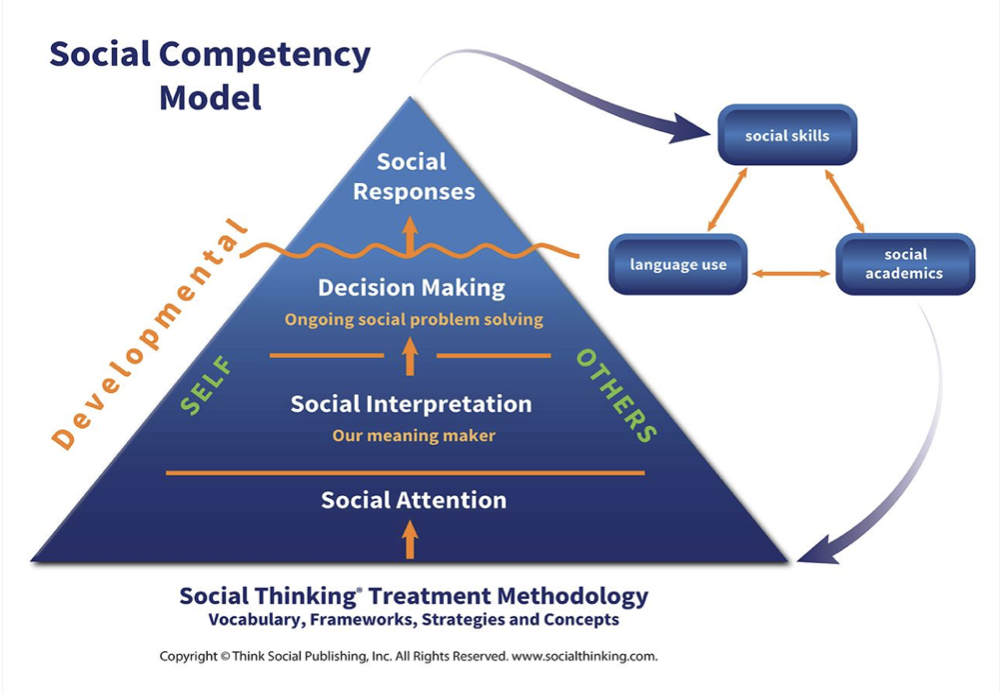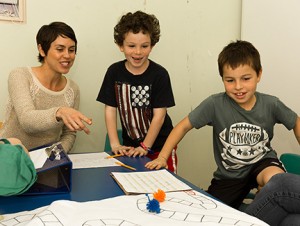How Can My Child Learn Social Skills?
Social brain building to become a “we thinker”, a successful group participant and a friend, is one of the hardest jobs of childhood.
Weather your child is 4, 10 or 15, being a competent social learner does not always happen intuitively. Learning social skills will require that your child is able to attend to a lot of data and decide what are the most important pieces of information, and use emotion, language and motor skills to respond in an appropriate manner within a relationship. A child can acquire those tools when he/she is given the opportunity to experience interactions with others that result in positive and negative outcomes, and is supported throughout the learning process. These learning opportunities can be facilitated by informed, knowledgeable and compassionate mentors, including parents, teachers and therapists. They can bridge the gap for the child and help him build the “scaffold” needed to move to higher learning.
It is often confusing when we see a child, of any age, struggling. We often think first about the psychology behind the child’s temperament and behavior – does it stem from environment, living situation, relationships? In reality, learning to be a social being and be socially competent is really based on a highly complicated neurological process – a process that is automatic for most and creates stress and struggle for some.
Social learning relies heavily on foundations in development that have been put in place to regulate how the brain perceives and processes incoming sensory information, and how it then organizes and delivers an output that is expected and connected, resulting in a positive social outcome. The Social Thinking® (Attributed to Michelle Garcia Winner as creator of the Social Thinking Methodology)Social Competency Model, shown here, uses an iceberg as an analogy. The visible part of an iceberg and what we see above the water, represents the things we can see people do, such as their social skills and behaviors. Yet the entire iceberg is much bigger than that, having a large foundation that goes far and wide into the depth of the sea, correlating to the knowledge, experience and development we hold – the collective information we draw upon and use to interpret and respond to social information that we experience.

As parents, we unknowingly assume our child inherently owns the skills to be a social thinker and adapt collaboratively in any environment. We think that our child’s social learning will just happen on its own.
The fact is that up to 20% of children will struggle with the jobs of childhood due to underlying processing challenges stemming from brain development. They may or may not have functional development and or learning challenges that lead to a diagnosis of speech and language disorder, sensory integration dysfunction, ADD, autism etc. These children are at risk for social challenges often due to their individual processing challenges. Finding a team of professionals, (Occupational Therapist, Speech Therapist, child psychologist) who can identify why your child struggles is the first step to creating a plan on how to build their base of social development.
Red flags that your child might be struggling to build friendships and to develop social skills:
- Prefers to play alone and does not play interactively with other children
- Difficultly understanding how to gain attention appropriately
- Difficulty initiating interactions
- Difficulty staying on topic during conversations
- Difficulty making relevant comments during conversations
- Difficulty following game rules
What types of therapy help a child develop social skills?
 During a child’s time as a pre-schooler, an Occupational Therapist can determine if sensory and/or sensory motor processing challenges exist. The OT can also determine if a child is having difficulty with self-regulation, joint attention and intention for a shared play experience. A Speech Therapist can work with a child with language processing issues, and a “peer to peer” or “social brain building” group can be facilitated by both OT’s and ST’s to teach concepts such as collaborative play, cooperation and negotiation.
During a child’s time as a pre-schooler, an Occupational Therapist can determine if sensory and/or sensory motor processing challenges exist. The OT can also determine if a child is having difficulty with self-regulation, joint attention and intention for a shared play experience. A Speech Therapist can work with a child with language processing issues, and a “peer to peer” or “social brain building” group can be facilitated by both OT’s and ST’s to teach concepts such as collaborative play, cooperation and negotiation.
In elementary school, a Speech Therapist can determine a child’s level of receptive and expressive language, auditory processing abilities, and his use of social-pragmatic language. If language processing and sensory/sensory motor integration issues have been ruled out, small groups facilitated by a psychologist, are helpful in honing a child’s emotional and attention regulation skills.
At Child Success Center, once a therapist has made an assessment and determined the root of a child’s social struggles, then a recommendation is made for the “right fit” therapy.
Options include:
- Individual Occupational Therapy and/or Speech Therapy: One child working with one therapist as part of OT session or collaborative session with ST, with opportunity for peer to peer play experiences in our sensory motor gym to build foundational social skills.
- Paired Peer Speech and Language Sessions: 2 children who have been matched for optimal outcome success, working with a Speech and Language Pathologist.
- Friendship Club: Small group of 4-6 children matched for group skill building needs utilizing social thinking and supporting inside out social emotional development- Led by psychologist.
Ultimately, we want our children to be able to relate to other people’s feelings and to experience a sense of belonging in their classrooms, homes and community. With a solid foundation of social skills, any child can be the key to his own success.
Learn more about Social Learning Programs, peer-to-peer play, and Friendship Club at Child Success Center
This program, including its teacher or leader, is not affiliated with, nor has it been reviewed, approved, or endorsed by Michelle Garcia Winner and Think Social Publishing, Inc.

